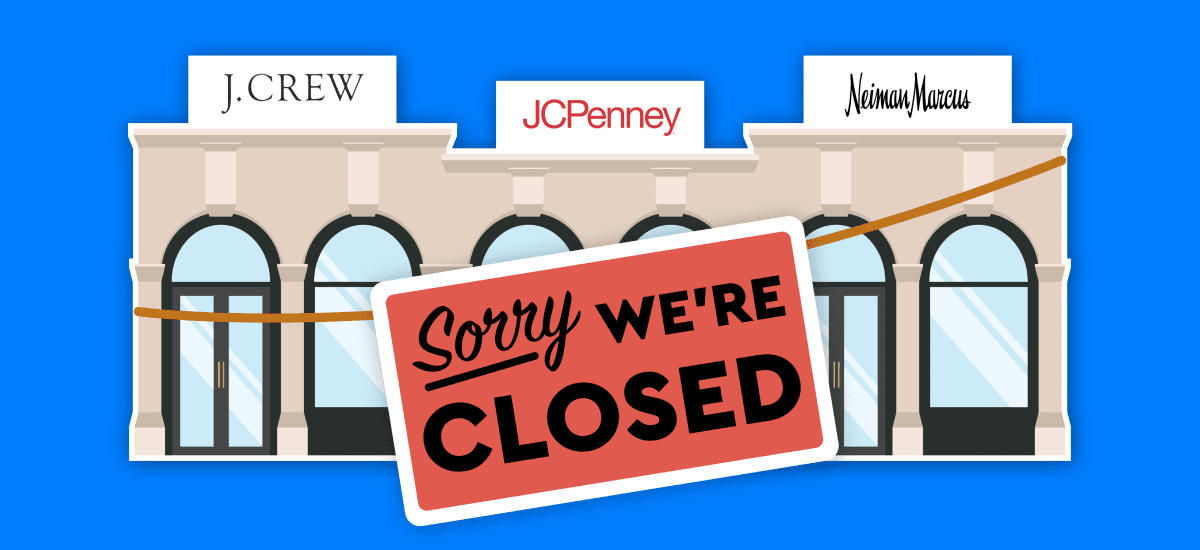As shelter in place orders have taken hold across the United States, many brick and mortar retail locations have been shuttered for weeks. As these brands face prolonged closures, many have faced bankruptcy proceedings, with companies such as J Crew, JCPenney, and Neiman Marcus all filing for Chapter 11 this month alone.
With so much uncertainty facing the future of these big ticket retailers, concerns are mounting that their landlords might face revenue blowback from retail tenants who simply cannot pay their rent. REITs across the country have been commenting on how they expect the possibility of tenant bankruptcies to show up on their own balance sheets, as well as how they are working with tenants who have already succumbed to COVID induced bankruptcy filings.
How is the Real Estate industry handling this uncertainty?
Takeaways
- STORE Capital Group has a high level of exposure to some of the industries hardest hit by the pandemic, and Fitch recently downgraded STORE’s ratings outlook on worries that many of its tenants may face bankruptcy
- Simon Property group said that major retailers which have filed for bankruptcy – such as Macy’s, Nordstrom and Neiman Marcus – are ready to restart as half of Simon Property Group malls are set to reopen
- Regency Centers Corp has not had to increase their bankruptcy watchlist since COVID has taken hold
- Federal Realty Investment Trust has 11 J Crew contracts which they expect to restructure through bankruptcy proceedings
- “There are tenants who drop out every time that there is a severe economic traction. This may be the poster child to that. Because not only is there an economic contraction, but there’s a total shutdown. So I mean, we are expecting failures on the part of some of our customers, and that’s part of the business. So I can’t quantify it. We have a watch list, as you would imagine. And so — but that will all come out in the wash over the next months and year.” Vornado Realty Trust
AlphaSense can track management commentary in real-time across the entire market, by industry, or watchlist. We expect this to be an interesting theme to follow throughout earnings season. Start your free trial of AlphaSense now or login to your account.
RPT Realty (Earnings Call – 5/12)
And we have a plan for every asset that’s not grocer. And some have leasehold encumbrances to — that we can’t get out of. But if a tenant falls in default or a tenant falls in bankruptcy and we see a way to get some of that real estate where we know we have a ABC Grocer, Whole Foods or Trader Joe’s, in our back pocket, that’s just more of a reason to actively negotiate or remedies for that location.
Simon Property Group Inc (Earnings Call – 5/11)
I think they — generally what I hear, for the financially solid retailers, there’s not an issue in terms of them getting the capital. And look, I will tell you, I mean, we’re not giving a percent of what we’ve collected. And let me just expound on it for a second, if I could. First of all, we’re much better than what the prognosticators — I’ve read some things thinking, well, this is where we’re at. We’re doing better than that, but I also don’t think it’s appropriate to air our discussions in the public format. And also you have to put in mind what percent we collect in April or May. It almost — in a sense, it’s not something overly to focus on because the reality is we have a lease and they have to pay. So we don’t have to give semantics. And the way I also think about it, yes, obviously if they decide they’re going to — they are in bankruptcy, then that’s when they get the right to reject the lease, but here’s also how I think about it. And I just want you to understand this, Alex. Say we got 50%, and it’s a hypothetical. If I was a retailer and I pay the 50%, I’d be basically upset that there were 50% that didn’t pay, on one hand. On the other hand, if I didn’t pay the 50%, I’d almost still justify in not paying because the reality is I’ve got another 50% of the retailers that didn’t pay. So we know what we’re doing here. We will navigate this. This is not easy, but I just think it’s better to have our discussion directly with the retailers. And the bottom line is we do have a contract and we do expect to get paid, and that — but I know somehow the market morphed into this number, but the reality is our business is a lot more complex than some of these others. And remember our rent roll is — a month of our rent roll is sometimes greater than these guys for the entire year. So we’re a little more complicated, a little bigger. And we’re — I think we’re navigating it appropriately. So again, I wanted to give you context to that, and I hope that was helpful.
Essential Properties Realty Trust (Earnings Call – 5/11)
Sure. As we said, AMC, as we sit today, we have 5 properties less than 3% of our ABR. They are in our unresolved bucket. So obviously, that’s an ongoing situation and negotiations, so I’d be reluctant to comment on it. I would say, in general, we’re really comfortable with the theaters that we own. And we were very selective in the theaters that we purchased over the last 3, 4 years. And as with an Art Van situation, we would expect that if there is a bankruptcy filing, our assets would be assets that the company would choose to restructure around and we would emerge relatively intact. And so we have confidence on underwriting, confidence in our asset selection, and that pertains for the whole portfolio and specific for AMC.
STORE Capital Corp (National Real Estate Investor “What’s in Store for Warren Buffet’s Only REIT Holding” – 5/18)
Nonetheless, an April 26 report from Newport Beach, Calif.-based real estate research and advisory firm Green Street Advisors LLC points out that among net lease REITs, STORE has one of the lowest levels of investment-grade tenants. On top of that, Green Street notes, STORE has a high level of exposure (19 percent) to industries that have been slammed by the pandemic, such as movie theaters, casual dining restaurants and gyms . By comparison, the REIT has lower exposure (6 percent) to industries that have flourished during the pandemic, including dollar stores, quick-service restaurants, drugstores, grocery stores and wholesale clubs.
Green Street warns that amid the shaky economic environment, STORE “is likely to see tougher lease negotiations and higher credit losses.”
In April, Fitch Ratings downgraded STORE’s ratings outlook from stable to negative. It cited “the prevailing uncertainty for retail businesses that are currently unable to generate revenue and the possibility of widespread lease non-performance and bankruptcy events, particularly within [the REIT’s] middle-market tenant roster.”
Simon Property Group Inc (New York Post “Simon to reopen half of its malls within a week as states begin to reopen” – 5/12)
Simon Property Group had already reopened 77 US retail properties as of Monday with coronavirus safeguards in place such as social distancing, increased sanitizing and health screenings for employees, David Simon said.
The company — whose US portfolio includes more than 200 malls, outlet centers and other properties — started reopening locations last week in places where officials have eased restrictions aimed at curbing the spread of the bug, Simon said. Those lockdowns have upended the retail industry by shuttering stores across the country.
“We are, of course, working in conjunction with state and local governments and our reopening plans,” Simon told analysts on a Monday conference call. “Shopper response to our reopenings has been positive, and sales as many tenants have been better than their initial expectations.”
While he did not detail how many stores had reopened within the malls, Simon said major chains including Macy’s, Nordstrom and Neiman Marcus — which filed for bankruptcy last week — were ready to restart.
Details of Simon’s reopening plans came as the Indiana-based company revealed its first-quarter net income dropped 20.2 percent to $437.6 million. Simon said business was strong in the first two months of the year before the coronavirus forced the firm to close malls and cut costs in March.
The company warned that it could see a “material reduction” in rent collections as tenants struggle during the virus crisis.
Simon said it had agreed to rent deferrals and some concessions, but discussions with tenants are ongoing.
Simon’s struggles came as the coronavirus plunged retailers such as J.Crew, Neiman Marcus and Stage Stores into bankruptcy. The pandemic caused nationwide retail sales to plunge by a record 8.7 percent in March.
CBL & Associates Properties Inc (Troubled Company Reporter “Fitch Lowers LT Issuer Default Rating to CC” – 5/8)
CBL’s deteriorating operating performance, specifically negative same-store NOI, and a weak liquidity position, including limited capital access, have resulted in minimal headroom for the company’s credit profile to navigate coronavirus-related retailer tenant stress. The company has drawn substantially all of its remaining revolver capacity.
Fitch expects property-level fundamentals will remain pressured by store closures and bankruptcies of weaker performing retailers, exacerbated by the current social distancing and wide spread retailer closures, which will challenge the company’s ability to sustain portfolio and financial metrics. Fitch believes the current coronavirus-related fallout will accelerate deterioration in performance of struggling retailers and lower quality mall assets, increasing the rate of store closures and bankruptcy activity and potentially triggering additional co-tenancy clauses.
Notably, the company’s credit facility considers the delisting of its common equity as an Event of Default. The company will be seeking to execute a reverse stock split at its April 2020 Annual Meeting to remedy its sub-$1 share price. Investor sentiment regarding retail real estate, specifically low- to mid-tier mall assets, has been negative and Fitch anticipates this will persist.
KEY RATING DRIVERS
Cash Flow Erosion: Fitch expects CBL’s operating metrics will deteriorate further in the near term. The company’s original FY20 guidance called for same-center NOI declines of -9.5% to -8.0%, prior to accounting for coronavirus-related impacts including further foot traffic dissipation due to social distancing and accelerated store closures and bankruptcy events for struggling retailers. CBL has since withdrawn its public guidance citing uncertainty related to the coronavirus.
Operating performance has been affected most significantly by ongoing department store anchor weakness (i.e. JC Penney, Macy’s) and related co-tenancy clauses in combination with store closures and bankruptcies of material in-line tenants (i.e. Victoria’s Secret, Foot Locker, Forever 21, etc.). Rent concessions, growing tenant improvement costs and shorter lease terms characterize CBL’s leasing activity in the last several quarters.
Regency Centers Corp (Earnings Call – 5/8)
Question – Greg Michael McGinniss: So I’m seeing a few somewhat dire reports on the potential fallout of retailers due to the pandemic, primarily in apparel, specialty retail, restaurants. I’m just curious what your exposure to bankruptcies have been thus far this year? How your watch list has evolved through the pandemic? And what steps you’re taking to try and mitigate any potential fallout?
Answer – Michael J. Mas: Greg, I’m sorry, maybe a little bit of a broken record on too early to tell. And in fact, it is. I think really from a high level, nothing has really changed with respect to our watch list. The sizing of our watch list is about the same as it has been. It’s been less than 5% of our ABR identified. Do we anticipate that there could be some acceleration in tenant failures and bankruptcy filings? Absolutely. This is an environment that will certainly result in that. But we haven’t added any one of significance to our watch list in some time, and I don’t think the situation has resulted in that occurring just yet.
Answer – Lisa Palmer: And I think I would add, as I think about the part of retail real estate that we operate in, I think it’s best positioned. Whatever that post-pandemic world looks like, I like the fact that we are close to neighborhoods and that we have grocery-anchored shopping centers and the quality of our real estate. It’s something that was true pre COVID, and it’s certainly going to be, I think, even more true post COVID, as retailers continue to focus on having a physical presence, which I think they still need. And if anything that perhaps this has highlighted some of the difficulties and the cost of delivering and picking up and that a physical presence really is going to be critical as part of their overall strategy and being close to the customer and having the best location is going to be of critical importance to them.
Gladstone Land Corp (Earnings Call – 5/8)
So there’s nothing out there today that’s coming at us. COVID-19 is not the problem. It’s what the nutty government is doing to stop the COVID-19. And until you get people back out there and working and eating and going out to restaurants and all of these things, I think things just go along as they are for us right now. We’re in a good place. We’ve not suffered any — no one in the group has — we don’t — I don’t even know of anybody that’s had COVID-19. So as a result, all of our people are in good shape. All the people we work with are in good shape, and everything is going as if there was no tomorrow in terms of people buying food. I feel really strong about it today, Henry. And we don’t really see anybody out there that’s near bankruptcy or problems. The few deals that we had that were slow, we got rid of, in terms of bringing in new people. So right now, everything is rosy. It doesn’t mean it’s going to be rosy next week, but it’s rosy today.
Federal Realty Investment Trust (Earnings Call – 5/7)
Question – Floris Gerbrand Hendrik Van Dijkum: Got it. One other question maybe for me. I note that J.Crew has crept into your top 25. Can you maybe comment generally on your — what you deem to be your at-risk tenants? Whether on average, they have rents that are above or below market? And what kind of potential impact it would be to retenant some of those? And maybe — and how many of the J.Crew locations do you expect to retain following the bankruptcy?
Answer – Donald C. Wood: Still early to tell, but we’ve got about 11. We’ve got 5 J.Crews and 6 Madewells. When I look down the list, they are all productive places. And so I would expect — I don’t know for sure yet, but I would expect J.Crew to want to restructure those deals and not reject those deals, which really makes them just like everybody else out there who’s entering the negotiation phase. So I don’t know. But when you look at where ours are, we’ve got both a Madewell and a J.Crew at The Grove in Shrewsbury at Barracks Road in Charlottesville and Third Street Promenade, and then another at Santana, another at The Point. These are — they’re at really good locations. And so in terms of being able to either cut a deal with them or backfill them, I feel pretty darn good. They’re in our best places.
Realty Income Corp (Earnings Call – 5/5)
Another industry that we are keeping a close eye on is childcare, which represents about 2.5%, 2.4% of our rent. And there, thankfully, again, we are exposed to 2 of the larger national operators in KinderCare and La Petite. But there are — there do tend to be a lot of mom-and-pop players, and they probably will be forced into bankruptcy within this particular industry just because they don’t have the liquidity or the balance sheet strength to withstand a longer-term shutdown.
Rexford Industrial Realty Inc (Earnings Call – 5/5)
By the way, thank you for the question. I just want to elaborate a little bit. And I think as Adeel said, timing, obviously, is going to have a lot to do with this. And the length of time the businesses remained closed is going to have a lot to do with this and there’s a lot of uncertainty there. What’s interesting is that the California governor has already started opening up some of the economy that was previously restricted, including some retail businesses and others. So maybe there’s some cause for optimism there. And I think what’s really interesting is and this might be contrary to some popular assumptions out there with regard to smaller tenants. We have well over 1,400 tenants. We’ve had 0 bankruptcies. Yet every week, I’m reading about numerous bankruptcies in the country. And almost all those bankruptcies are national companies with a national or even global footprint. They’re biased towards retail, which is a trend that started years ago. And so the data, again, is telling us that at least with regard to our portfolio, we’re not seeing that level of tenant distress.
And yet the tenant distress is coming from larger companies, actually.
Vornado Realty Trust and Alexanders Inc (Earnings Call – 5/5)
Question – James Colin Feldman: So I’d like to get your latest thoughts on long-term tenant credit quality, especially in retail coming out of this. We’ve seen now headlines of several bankruptcies coming through in the last week or so. Just what — I know we’ll get through this and things will get back to normal. But how do you now feel about the tenant credit default risk? And then, I guess, any changes to your reserve balance? I know you don’t give guidance, but to the extent that that’s changed at all.
Answer – Steven Roth: The question is as to our thinking about retail credit, Jamie?
Question – James Colin Feldman: Just risk that more of your retailers may go bankrupt or even some of your small businesses may go bankrupt, making it through this and how have you reserve for it?
Answer – Steven Roth: Well, the answer is that I think — I’ve read most of the transcripts of all of the gang that have had the conference call so far. I think we’re the only one that raised the point of a bad debt reserve in our remarks. So we — periodically, we will see — this is a new thing for us and everybody. This is the first time we have ever had accounts receivable of any moment. So when you have accounts receivable, you have to go down into the weeds and figure out what our debt reserve will be, which we — I think I gave an inkling of what our thinking was in my prepared remarks when I got to the $1 a foot for 12 months might be the cost of COVID so far. So we don’t have anything to say about a debt reserve yet. When we publish our financial statements, we will, of course.
Question – James Colin Feldman: But I guess, taking a step back, just kind of your view of whether it’s your retail tenant base or even some of your office tenant base that may not make it through this downturn. How have your views changed from, say, a quarter ago?
Answer – Steven Roth: Well, I mean, the history is, is that there are tenants who drop out every time that there is a severe economic traction. This may be the poster child to that. Because not only is there an economic contraction, but there’s a total shutdown. So I mean, we are expecting failures on the part of some of our customers, and that’s part of the business. So I can’t quantify it. We have a watch list, as you would imagine. And so — but that will all come out in the wash over the next months and year.
Spirit Realty Capital Inc (Earnings Call – 4/13)
Answer – Vikram Malhotra: Okay. That’s helpful. Because I thought that there would be some tenants that probably pay into the second week or the third week, but I guess that’s more in office, but that’s helpful to have. Can you just maybe give a little bit more color on sort of the theaters, Goodrich, specifically, and just kind of your expectation going forward?
Answer – Jackson Hsieh: Yes. So I’ll come back to Goodrich in a minute. But when you look at our movie segment, which is just a little over 7% of our total contractual rent, it’s broken down into — leaving Goodrich out, it’s 7 operators and it’s pretty balanced. So like our biggest one is not the big 2. So Regal and AMC are on the top end, but they’re not the largest. So it’s fairly spread out. And I would tell you that some of our regional theater operators have really, really good credit, like low debt to EBITDA. So we think that that’s going to probably be an opportunity for some of the regionals and maybe consolidate more theaters as they think about their opportunity. And obviously, we’re in a position to help them. So we will look at that very carefully with them. But getting back to Goodrich. So Goodrich paid March rent. They’re going to pay a nominal rent this month. The bankruptcy courts right now, I don’t know if you focused on what happened with Pier 1. We have one of those stores. The judge basically kind of put a time out on the going out of business sales as it relates to landlords getting paid rent during that administrative period. So the Goodrich situation is sort of the same thing, kind of things are frozen right now, at least for the next 60 days. I can tell you that we have interest in those theaters. The master lease is still in place. And — but there’s just not a whole lot happening in the bankruptcy courts right now, just generally, just given a lot of courts are not actually in place, physically in place right now. Ken, do you want to add any more on Goodrich at this point?
Answer – Kenneth Heimlich: No, no, I think that captures it. It’s just — it’s what’s going on in a lot of bankruptcy cases. They’re kind of “mothballing” things for the next 30, 60 days until sale processes can be run as they should be. But…



